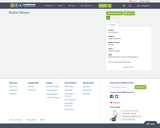
- Subject:
- Higher Education
- Material Type:
- Module
- Author:
- Rachel Meyer
- Date Added:
- 06/07/2016

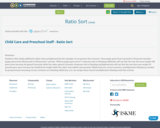
Students often think additively rather than multiplicatively. For example, if you present the scenario, "One puppy grew from 5 pounds to 10 pound. Another puppy grew from 100 pounds to 108 pounds." and ask, "Which puppy grew more?" someone who is thinking additively will say that the one who now weighs 108 grew more because he gained 8 pounds while the other gained 5 pounds. Someone who is thinking multiplicatively will say that the one that now weighs 10 pounds grew more because he doubled his weight while the other only added a few pounds. While both are correct answers, multiplicative thinking is needed for proportional reasoning. If your students are thinking additively, you can nudge them toward multiplicative thinking with this activity.
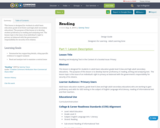
This lesson is designed for students in adult basic education grade level E (low and high adult secondary education). The purpose of this lesson is to develop student proficiency in reading and analyzing text. The lesson topic is the issue of an individual’s right to privacy as balanced with the government’s responsibility for security of its citizens.

Evidence Based Reading Training focused on Vocabulary, Fluency, Phonics & Comprehension. By learning about root words, prefixes and the like my students find more fluency & comprehension in the GED materials that they work with.
I am sharing some of the different resources I have found & created to use in teaching ABE, or Adult Basic Education.
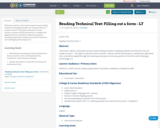
This lesson will be a real-world scenario-based reading module for Reading Scientific and Technical Text, for readers at level 7. Through an interactive visual scenario, learners will be introduced to a sample loan application form, and will be walked through the meaning and purpose of primary portions of the form and challenging terminology in it.
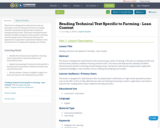
This lesson is designed for adult learners who are pursuing a career in farming. It focuses on reading scientific and technical texts (Grade 6) related to farming and farm loans. This lesson will help learners identify and define technical words specific to farming and borrowing money. The learners will have the opportunity to apply their acquired knowledge in class activities such as reading and analyzing case studies.

The purpose of this lesson is build on a previous lesson that teaches how to take out a farm loan.This lesson is designed for adult learners who are pursuing a career in farming. It focuses on reading scientific and technical texts (Grade 6) related to farming business plans. It will help learners identify the resources necessary to develop a simple farm business plan. The learners will have the opportunity to apply their acquired knowledge in class activities such as discussion to analyze case studies and develop the basic outline of their resource sheet.
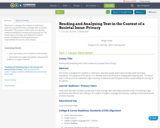
This lesson is designed for students in adult basic education grade level E (low and high adult secondary education). The purpose of this lesson is to develop student proficiency in reading and analyzing text. The lesson topic is the issue of an individual’s right to privacy as balanced with the government’s responsibility for security of its citizens.
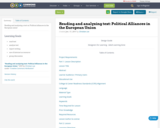
Reading and analysing a text on 'Political alliances in the European union'
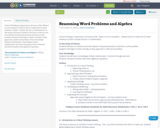
Critical Thinking is important in all areas of life. Math is not an exception. I believe that it is important to teach students to think “outside the box” in mathematics.
In this series of lessons:
Students will learn to observe and note details of sequential patterns and then a math problem.
Students will begin to think critically as they approach a math word problem.
Prior Knowledge:
Students should have a knowledge of basic mathematics: fractions through percents.
Students should be familiar with algebraic equations.
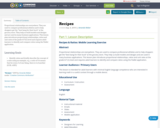
Proportional relationships are everywhere. They are used to compare professional athletes and to help shoppers get the “best bang for their buck” at the grocery store. They help us build models and designs and are used in many business applications. This lesson plan introduces proportional relationships, ratios and unit rates at the grade 6/7 (C) level and requires adult learners to identify and compare ratios using the Padlet application.
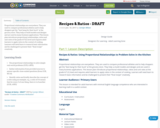
Proportional relationships are everywhere. They are used to compare professional athletes and to help shoppers get the “best bang for their buck” at the grocery store. They help us build models and designs and are used in many business applications. This lesson plan introduces proportional relationships, ratios and unit rates at the grade 6/7 (C) level and requires adult learners to apply ratios in the context of cooking. Learners will need learn to research basic information and be challenged to present their “final recipe” creatively.

This virtual manipulative allows the user to visualize the product of two factors in three different ways: click on any of the options below the array to choose Grouping, Common, or Lattice.
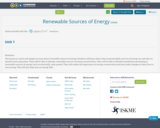
The lesson is a short and simple account about renewable sources of energy. Students will learn about what nonrenewable sources of energy are and why we should avoid using them. They will be able to identify renewable sources of energy around them. They will be able to identify installations pertaining to renewable sources of energy such as wind mills, solar panels. They will realize the importance of energy conservation and may make changes in their lives to save energy. This will also help save on energy bills.
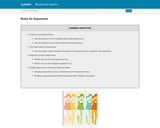
Laws of Exponents
Product and Quotient Rules
The Power rule for Exponents
Negative and Zero Exponents
Simplify Expressions using the Exponent Rules
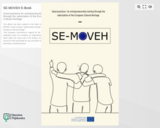
This e-book represents the 3 years of work on the topic of European Cultural Heritage as an opportunity for employment and self-employment of young adults. All the practices are collected here and are useful to organize training activities in different socio-cultural contexts.
This resource has been realized in the frame of the project "SE-MOVEH: Social Inclusion Opportunities through the Valorization of European Cultural Heritage", co-financed by the Erasmus+ programme, under the Key Action 204.
The European Commission's support for the production of this publication does not constitute an endorsement of the contents, which reflect the views only of the authors, and the Commission cannot be held responsible for any use which may be made of the information contained therein.
PDF version: https://drive.google.com/file/d/1d5fhLCb_SX6Vf9n8ap3f2Aluv0fqQbnB/view?usp=drivesdk

Sexual Violence Prevention and Response Training for B.C. Post-Secondary Institutions
Short Description:
The Safer Campuses for Everyone training is a 75 minute online, self-paced, and non-facilitated training on preventing and responding to sexual violence in post-secondary institutions. This training is recommended for all members of the campus community: students, faculty, administrators, and staff. This implementation guide is intended to support post-secondary institutions in customizing and delivering the Safer Campuses for Everyone training. It includes information about how to adapt and edit the course content using the web application Articulate Rise and how to share the course through a learning management system such as Moodle, Blackboard, Canvas, and D2L.
Long Description:
The Safer Campuses for Everyone training is a 75 minute online, self-paced, and non-facilitated training on preventing and responding to sexual violence in post-secondary institutions. This training is recommended for all members of the campus community: students, faculty, administrators, and staff. This implementation guide is intended to support post-secondary institutions in customizing and delivering the Safer Campuses for Everyone training. It includes information about how to adapt and edit the course content using the web application Articulate Rise and how to share the course through a learning management system such as Moodle, Blackboard, Canvas, and D2L.
Word Count: 6286
(Note: This resource's metadata has been created automatically by reformatting and/or combining the information that the author initially provided as part of a bulk import process.)
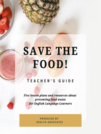
Save The Food! A Food Waste Prevention Teacher's Guide This resource provides five lesson plans and resources about preventing food waste. Wasted food costs money and harms the environment. This course explains basic concepts of food waste prevention and provides easy tips for students to follow. The content was adapted from the EPA’s “Food: Too Good to Waste” tool kit.The course was developed by Audrey Seligman, MPH, with assistance and consultation from George Schooley, M.A. TESOL. Funding for the course was provided by the Ramsey/Washington Recycling & Energy Board.
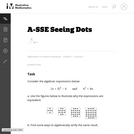
The purpose of this task is to identify the structure in the two algebraic expressions by interpreting them in terms of a geometric context. Students will have likely seen this type of process before, so the principal source of challenge in this task is to encourage a multitude and variety of approaches, both in terms of the geometric argument and in terms of the algebraic manipulation.
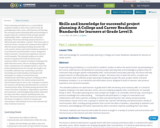
Project planning and delivery is a crucial skill for academic studies as well as the world of work. By participating in this course, adult learners will develop the necessary project planning skills and knowledge to prepare them for continued study and gain specific employability skills- communication and project planning. This lesson will help prepare learners to effectively plan and deliver a project. The lesson aims to teach the terms, concepts and communication skills of effective project planning including the project life cycle, project charter and work breakdown schedule. It is an interactive and informative course, designed to build on learners’ own previous experience and real world examples.
The intended audience are adult learners at grade level D with low literacy and numeracy skills. It is aimed at students studying in the adult education sector, who are studying alongside other commitments, for example family or work. The project planning terms and concepts are taught in an accessible, informal way, connecting to previous knowledge and understanding. Participants will participate in a range of conversations and collaborations with others partners, building on ideas and expressing their own clearly and persuasively. Conversations may be one-to-one, in groups or teacher-led. Learners will develop and demonstrate a variety of communication skills, including posing questions that connect the ideas of speakers, responding to questions and comments, acknowledging information expressed by others and when required, qualifying their own views.
The lesson materials and resources will enable the lesson to taught in a variety of contexts and environment, with minimal access to the internet and other technical resources.